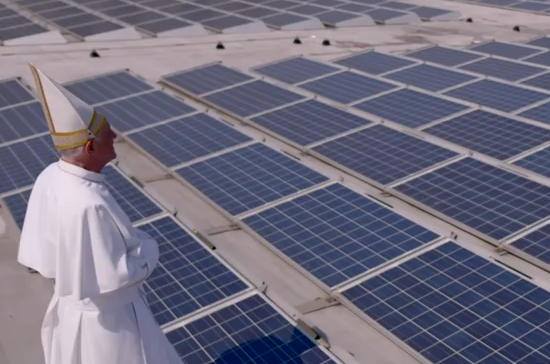As the world holds its breath for the papal encyclical on the environment—and those at other publications pour over the leaked draft—I wonder whether some of those anticipating it most are in for disappointment. Perhaps they’re expecting the pope to mention their particular pet ideology or policy proposal. Perhaps they hope it will denouce the big, bad oil executives outside of whose offices they’ve protested. It probably won’t do either. It also won’t single-handedly turn the tide of our losing battle against our own appetite for carbon.
If this encyclical is successful, it will be because it inspires creative, diverse responses to the challenges it poses, rather than merely solidifying the existing political battle-lines. I’m less interested in the encyclical itself, really, than in what we the church—together with all people of good will—can do with it.
We need all the ideas we can get.
The Maryknoll Office for Global Concerns, an arm of the Maryknoll mission organizations, has for the past year been publishing a series of of primers called Encounters: A Newsletter on Faith, Economy, and Society. They’re an excellent collection of prospects for a healthier economy and a healthier planet, presented in light of Catholic social teaching.
For instance:
- Think beyond economic growth. What other ways can we measure our economy than growth? There’s the “steady state” model of Japan, or a “circular” economy that better resembles natural ecosystems. The prospect of peak oil may make these approaches more a necessity than a choice.
- Democratize the energy system. While carbon-based energy systems tend to favor big, monopolistic infrastructure, renewable sources may work best with local networks of energy production that are more resilient and more fully controlled by the people who rely on them.
- Build businesses based on sharing and cooperation. While conventional big business is accountable largely to profit-seeking shareholders, cooperative businesses—owned by their workers and customers—have the common good baked into their structure. The “sharing economy” enables us to get by with less stuff and more community, but, as I have argued, it still has much to learn from Catholic social teaching.
- Let information be free. Control over information through restrictive patents and copyrights is one of the ways that wealthy countries have managed to keep the fruits of the carbon economy for themselves. Open knowledge policies, which have precedent in Catholic teaching, could allow for an economy of local production rather than carbon-intensive imports and exports. Ensuring the availability of essentials like seeds and medicines—both restricted under current trade regimes—will help prevent the poor from being left out of the emerging information economy.
These are slow, long-term proposals, and they’re no substitute for the strong international agreements that we so urgently need this December in Paris. But they help to remind us that real stewardship is not the result of a stopgap, or one faction winning out over another, or the arrival of a papal superhero. It begins with how we treat each other, and what we choose to value.









Good point of clarification. If you look at the discussion of this topic in the Maryknoll documents, they're not proposing the elimination of intellectual property protection; rather, they're talking about efforts like Ecuador's FLOK Society project (which I attended last year) that aim to bring more diverse open licenses, into a wider range of fields. If you look at Creative Commons licenses, for instance, they allow more openness of information while retaining an appropriate legal framework for doing so.
The goal is not to encourage piracy, but we do need appropriate intellectual property regimes. At the moment, fair use and the public domain are being radically eroded by rent-seeking corporations, which often rely on publicly funded research for their patents. We can do better.
Regarding the photograph accompanying the blog post: though I have not seen this video (or heard of it), I can only say that this is no actor "playing" Pope Francis here. It seems to me that somehow somebody "photoshopped" a photograph of John Paul II alongside the solar panels and took a rather bland-looking mitre and put it on his head, and placed it at a rakish angle, to boot. The way the mitre is placed, it gives off an overall clownish effect (it looks like a dunce cap!), which I guess was the intention of the "satire." If I am mistaken, the physical stance of the "pope" as seen here is eerily reminiscent of John Paul II.
To see the video, just click either the first or last link in the article. Enjoy!
Mr. Schneider,
I just saw the video. This "ninja-pope" can pack a lot of action in less than two minutes! So, I'll revise my opinion of who this actor-cum-pope reminds me of: he looks like E. G. Marshall! At least, a little bit...